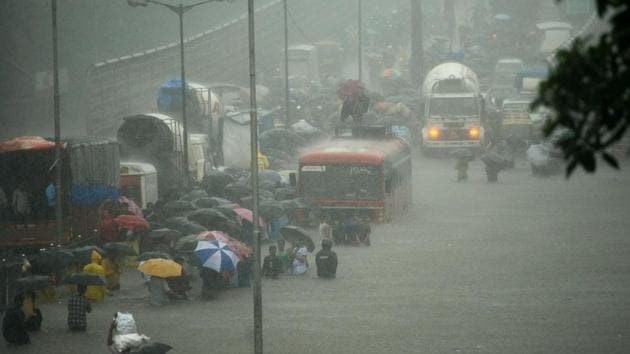Mumbai floods: Are we learning from our past?
While some of our cities may notionally indicate a change towards preparedness for disaster response, almost all cities fail to demonstrate proactive planning and strategic actions executed.
Mumbai paralysed yet again. Is it a lack of comprehensive efforts in building the resilience of the city towards such events? Is it the failure of a traditional urban planning approach capable of only addressing limited dimensions of urban development? Is it the continued impact of climate change which our mega cities are unable to deal with? Is it total laxity towards the operation and maintenance of existing infrastructure and services and much needed updation?

Or are there overarching issues of poor governance, lack of transparency and accountability; limited capacity of and coordination between local institutions and their inability to take and execute decisions in a timely manner? Or is it the Mumbaikar’s capacity to bounce back quickly to normal against any disasters, which has led to complacency and inadequate proactive planning by different institutions across different levels? Perhaps all of these are justified! However the most critical question is: Are we learning enough from such blatant failures in our star cities?
Over time, alarming numbers of average daily rainfall as well as rainfall intensity for Mumbai and other megacities including Chennai and Bengaluru, have been documented and analysed, but for hardly any long term and meaningful action by mandated authorities. While some of our cities may notionally indicate a change towards preparedness for disaster response, almost all cities fail to demonstrate proactive planning and strategic actions executed.
While mega cities with existing high density of built environment leave limited scope for comprehensive urban planning to be put in place, they do offer an opportunity through climate responsive redevelopment and retrofitting of infrastructure and built environment to strengthen resilience towards such disasters. This would also minimise the immediate and severe impact faced by the most vulnerable population of urban poor in metropolitan cities in India. An almost surgical approach to upgrade basic services such as drainage and sewerage, and waste management etc. shall be necessary on priority, for hotspot places such as low-lying areas and areas along natural drains or nallahs and river banks.
Another important question is – do we have robust research to back strategies and decision making at a city level and do policy makers rely on and pay required attention to such research outputs even from premier institutions of technology, management and policy and social sciences; or are they mainly challenged with firefighting and reactive modus operandi?
For medium and longer term solutions to be in place, research and higher education institutions must play a critical role in order to enhance the capacity of city institutions and in making urban planning a multidimensional and meaningful tool. Restricted and monitored changes in land use, efficient surface run-off with high and low tide balancing, increasing and maintaining soft landscapes, restoring and maintaining drainage catchments with controlled built environments, hi-tech early warning and information management systems, and reliable and effective desilting of drains with efficient waste management are a few of many such solutions.
Cost optimisation while planning mainly for milder events is not a reliable solution for cities under the threat of such disasters. For research and studies to provide consequential and reliable inputs to policy decisions, strategy making and implementation of actions for our cities and inhabitants, a systemic approach is imperative that is based on real gaps and accounts for multidimensional impacts.
While cities such as Mumbai, Chennai, Bengaluru, Delhi and even the planned city of Chandigarh have a lot to learn from the success and failures of others, it is critical that Mumbai learns more from Mumbai’s past!
Dr. Shaleen Singhal is associate professor, department of policy studies ,TERI University, New Delhi



